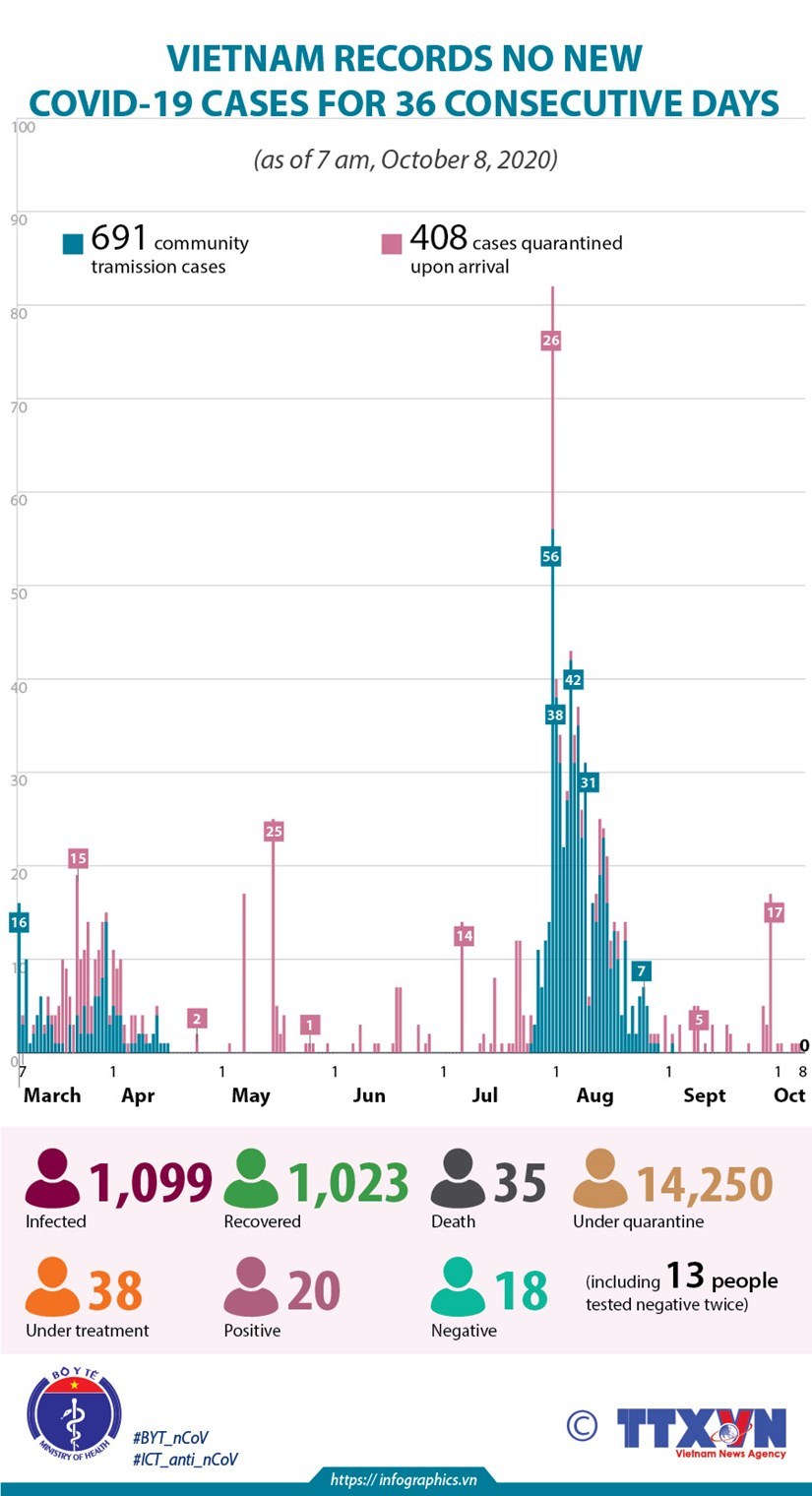 |
|
German newspaper Frankfurter Allgemeine Zeitung (FAZ) has spoken highly of Vietnam’s achievements in the fight against the COVID-19 pandemic. (Photo: VNA) |
Analysing anti-pandemic models between developed and developing countries, the article on October 6 said Vietnam has acted as a positive role model for controlling and preventing the novel virus.
Creativeness and effective preventive measures, not wealth or higher education ground, play the decisive role in the battle against the coronavirus outbreak, it said, highlighting while the number of COVID-19 cases are increasing in most of the European countries, Vietnam, Mongolia and Thailand virtually wipe out the virus.
The pooled testing initiative really works for countries which have small capacity in testing, it said.
Germany, which has announced nearly 10,000 deaths associated with COVID-19 should learn experience from Vietnam – a country with a population of some 100 million people that has seen only 35 fatalities.
In another writing, the FAZ underscored border closure and social distancing measures have helped Vietnam, Thailand and Singapore successfully control the pandemic.
However, the measures also have adverse impact on the regional economy. This is the first time in decades, the poverty rate in the region increased significantly, and the World Banks forecast 38 million people in East Asia could fall into poverty this year.
No new COVID-19 infections on October 8 morning
There were no new COVID-19 cases to report in Vietnam in the morning of October 8, which is also the 36th straight day without community transmission of the coronavirus in the country, according to the national steering committee for COVID-19 prevention and control.
The total number of COVID-19 infections remains at 1,099, including 408 imported cases quarantined upon their arrival and 691 domestically infected ones.
All hotbeds in the country have been brought under control, the committee said.
As many as 1,023 patients have recovered while most of the 35 related deaths were elderly people with serious underlying health conditions.
Among those still under treatment, five have tested negative once for the SARS-CoV-2 that causes COVID-19, eight others twice, and five thrice. No patients are in critical conditions at present, the treatment sub-committee noted.
There are 14,250 people having close contact with confirmed cases or coming from pandemic-hit regions under quarantine now, including 276 in hospitals, 11,549 in other quarantine sites, and 2,425 at home or accommodation facilities.
 |
Nearly 350 citizens brought home from Australia, New Zealand
Nearly 350 Vietnamese nationals who had been stranded in Australia and New Zealand due to the COVID-19 pandemic were flown home safely on October 7.
The flight was arranged by Vietnamese authorities, Vietnamese representative offices in Australia and New Zealand, and the national flag carrier Vietnam Airlines.
Passengers on board included children under 18 years old, the elderly, pregnant women, workers whose labour contracts expired, students without accommodation due to dormitory closure and others in difficult circumstances.
The Vietnamese representative offices sent their staff to help the citizens with pre-departure procedures.
Security, safety and hygiene measures were rigorously taken during the flight to prevent the spread of COVID-19.
Upon arrival at Tan Son Nhat International Airport in Ho Chi Minh City, all the crew members and passengers were given medical check-ups and put under quarantine in line with current regulations.
In the time to come, more repatriation flights will be arranged to bring Vietnamese citizens home, depending on their demand and domestic quarantine capacity./.
COVID-19 infections in six Indonesia provinces decline
The number of COVID-19 cases in six major provinces of Indonesia has dropped in the past week, said an expert team member of the country's COVID-19 task force on October 7.
The provinces include North Sumatra, Jakarta, West Java, East Java, South Kalimantan and South Sulawesi.
Speaking at an online press conference, Dewi Nur Aisyah said the decline is a good start and hoped that the number of infections will reduce in the following week.
In the past 24 hours, the number of infections in Indonesia rose to 315,714 cases while the death toll increased to 11,472. The pandemic has spread to 34 provinces nationwide, reported the Indonesian Health Ministry.
The same day, the Malaysian Health Ministry said the country recorded 489 new cases, raising the total infections to 13,993. Among the new cases, 487 were locally-transmitted. Fatalities still stood at 141./.
Thailand to allow grace period for migrant workers
Thailand is considering to allow migrant workers whose employment expires starting next month to remain in the country instead of having to return to their home countries to re-apply for employment from there.
The decision to allow the grace period, reached by the migrant workers' policy management committee chaired by Labour Minister Suchart Chomklin on October 6, was intended to stave off the spread of COVID-19.
The minister was quoted by local media as saying that if the migrant workers return to their home countries after having worked in Thailand for four years, as required under the memorandum of understanding signed between the government and those of respective countries, they might seek to come back to resume their employment.
This raises concerns about them contracting the virus while waiting to get back and bringing the virus with them when they return, said Suchart.
There is a real risk of imported infections triggering a second outbreak wave, he added.
Although Suchart did not say how long the grace period will last, he made it clear the issue will be proposed for the cabinet to consider in due course.
Eligible for the grace period are migrant workers whose four-year employment contracts end starting from next month until the end of December next year.
He added that for the migrant workers, returning to their countries and re-applying for jobs from there while also being subject to anti-virus measures including the 14-day quarantine at both ends would incur costs so steep that it would make such trips unaffordable and impractical.
Altogether 131,587 migrant workers from Myanmar, Lao and Cambodia will see their working permits expire between next month and December next year, according to the Labour Ministry./.